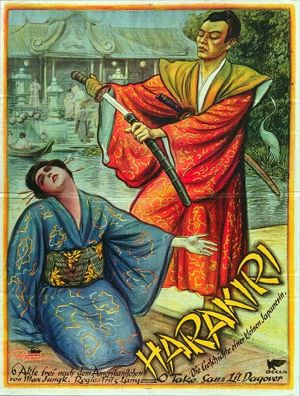- Harakiri (1919 film)
Infobox Film
name = Harakiri

caption = Film poster
director =Fritz Lang
producer =Erich Pommer
writer =Maz Jungk
from the play byDavid Belasco andJohn Luther Long
starring =Lil Dagover Paul Biensfeldt Georg John Meinhart Maur Rudolf Lettinger Erner Huebsch
cinematography =Max Fassbender
distributor =Decla-Bioscop
released =December 18 ,1919
runtime = 80 minutes
country = flagicon|GermanyGermany
language =Silent film
German intertitles
imdb_id = 0010208
amg_id = 1:148205"Harakiri", or "Madame Butterfly" is a 1919
silent film directed inGermany byFritz Lang . It was one of the first Japanese themed films depictingJapanese culture . The film was originally released in theUnited States and other countries as "Madame Butterfly" because of the source material on which it is based. The film starredLil Dagover .ynopsis
The
Buddha priest wants the Daughter of theDaimyo to become a priest at the Forbidden Garden. The Daimyo thinks, if he was in Europe, that his daughter should decide on her own, but he is denuciated and has to comit harakiri. She meets Olaf, a European officer, falls in love and marries him but after a few months he has to return to Europe. She gave birth to a child and is waiting for him, while he marries in Europe. When he comes back to Japan 4 years later, he is accompained by his European wife.Production
Indulging his taste for Japanese exotica, this early Fritz Lang film is a loose adaptation of the opera Madame Butterfly. Leaving most of the plot intact, Lang does little more than change the names of the lead characters (the opera's heroine Cio-Cio San becomes O-Take-San and the sailor who seduces and abandons her is now European). He also fills the frame with meticulously detailed sets and costumes that demonstrate a real familiarity with Japanese culture. Refreshingly stereotype-free, though the actors are all European, this film demonstrates that silent film can rival opera in emotional impact. When O-Take-San's father, sentenced to death by harakiri, reaches out to her as she walks away from him for the last time, his simple gesture calls up more emotion than any line of ever dialogue could. An uncharacteristic film for Lang in that it strays from his normal themes and settings, it nonetheless illustrates his considerable skill as a director, even at this early stage in his career.
References
* http://www.thefilter.com/Discover/Item.aspx?itemType=Film&id=105027
* http://www.tcm.com/tcmdb/title.jsp?stid=490685&atid=0&category=overviewLinks
http://www.imdb.com/title/tt0010208/
Wikimedia Foundation. 2010.
